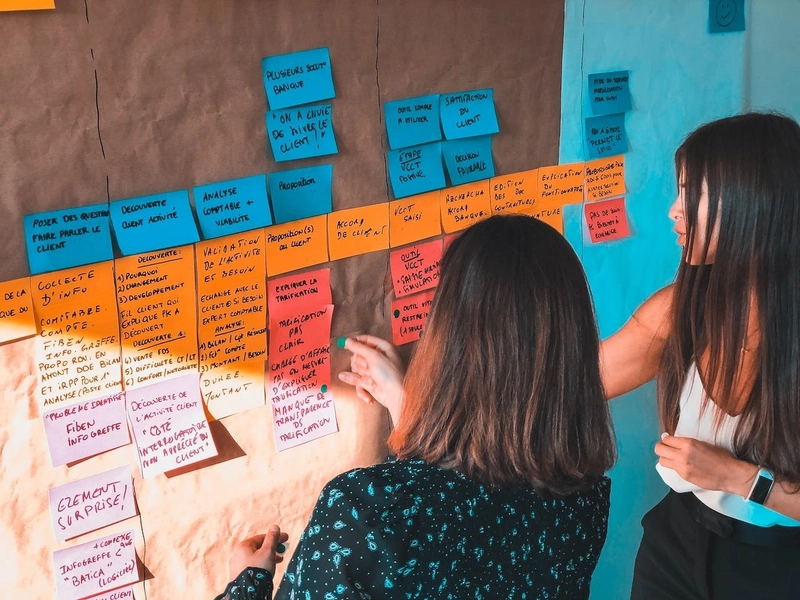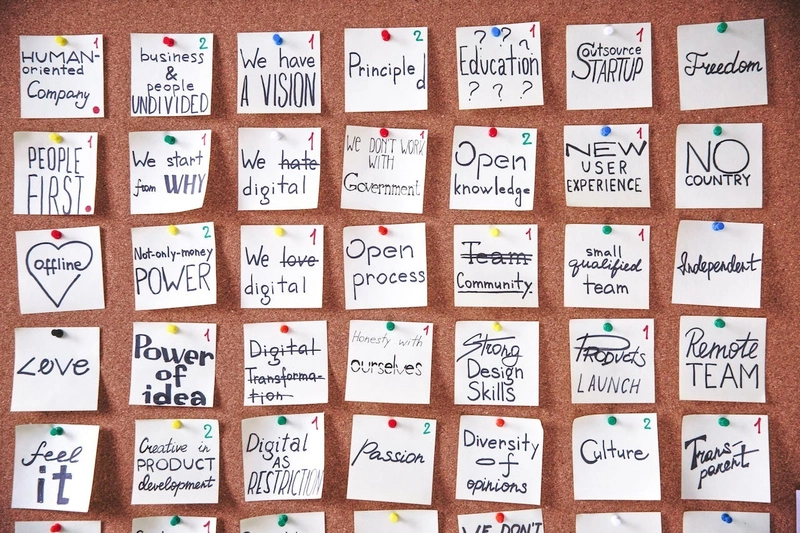1. Be a team player
Collaborate effectively, respecting and valuing the contributions of team members to achieve common goals.
2. Stay patient
Patience is key in coding, especially when dealing with complex issues or learning new technologies.
3. Regularly update your skills
Continuously learn and adapt to stay relevant in the ever-evolving tech landscape.
4. Simplify complex problems
Break down complex issues into smaller, manageable parts to find effective solutions more easily.
5. Practice clean coding
Write code that is not only functional but also clean, well-organized, and easy for others to understand.
6. Keep your code organized
Maintain an organized codebase with clear structure and comments for ease of maintenance and collaboration.
7. Respect deadlines
Manage your time effectively to meet project timelines, showing professionalism and reliability.
8. Embrace new technologies
Stay ahead of the curve by embracing and learning new technologies and tools in the tech world.
9. Practice code optimization
Continuously refine and optimize your code for better performance, readability, and maintainability.
10. Develop good listening skills
Listening skills are crucial for understanding project requirements and team communication.
11. Prioritize tasks efficiently
Efficient task management ensures important and time-sensitive projects are completed first.
12. Seek feedback regularly
Regular feedback helps identify areas for improvement and confirms when you're on the right track.
13. Maintain a positive attitude
A positive mindset can significantly impact your work quality and team morale.
14. Keep your workspace organized
An organized workspace enhances focus and productivity, reducing unnecessary stress.
15. Understand client needs
Grasping client requirements is essential for delivering successful, relevant solutions.
16. Learn from mistakes
View mistakes as learning opportunities to improve your skills and decision-making.
17. Value teamwork
Recognize that diverse skills and perspectives in a team lead to stronger solutions.
18. Stay adaptable
Be flexible and open to change, adapting to new challenges and environments quickly.
19. Network with peers
Networking builds relationships and opens up opportunities for collaboration and learning.
20. Avoid burnout
Take regular breaks and maintain a work-life balance to prevent burnout and stay productive.
21. Set achievable goals
Set realistic and clear goals for your personal and professional development.
22. Practice effective communication
Clear and concise communication is crucial in all aspects of software development and team interaction.
23. Stay focused
Minimize distractions to maintain high levels of productivity and quality in your work.
24. Manage stress well
Develop stress management techniques to maintain your health and work efficiency.
25. Be proactive
Take initiative, anticipate potential problems, and act to prevent or solve them early.
26. Follow industry trends
Keeping up with industry trends ensures that your skills and knowledge remain current and relevant.
27. Attend workshops and conferences
Participate in industry events for learning, networking, and staying updated on the latest technologies.
28. Balance perfection and practicality
Strive for high-quality work while being practical about time and resource constraints.
29. Master keyboard shortcuts
Boost your efficiency and speed by mastering keyboard shortcuts in your favorite IDEs and tools.
30. Practice regular refactoring
Regularly revisit and improve your code to enhance its structure, readability, and performance.
31. Develop debugging skills
Effective debugging skills are essential for quickly identifying and resolving issues in your code.
32. Share your knowledge
Sharing your expertise with others not only helps them but also reinforces your own understanding.
33. Stay curious
A curious mind leads to continuous learning and discovery of innovative solutions.
34. Set personal projects
Personal projects allow you to explore new technologies and ideas in a creative, low-pressure environment.
35. Collaborate effectively
Effective collaboration involves clear communication, respect for others' ideas, and a focus on common goals.
36. Learn project management basics
Understanding project management principles can greatly improve your efficiency and effectiveness.
37. Respect others' ideas
Valuing diverse perspectives can lead to more innovative and effective solutions.
38. Practice empathy
Being empathetic improves team dynamics and client relationships, fostering a positive work environment.
39. Develop critical thinking
Critical thinking skills enable you to solve problems more effectively and make better decisions.
40. Embrace diversity
Diversity in teams brings a range of perspectives, fostering creativity and innovation.
41. Practice self-discipline
Self-discipline ensures you stay on track with your goals and commitments, even without external pressure.
42. Build a strong work ethic
A strong work ethic demonstrates reliability and commitment to your craft.
43. Stay organized
Organization helps manage your workload more effectively and meet your responsibilities.
44. Maintain a healthy lifestyle
A healthy lifestyle boosts your mental and physical energy, positively impacting your work performance.
45. Manage your time effectively
Effective time management is key to balancing workload, deadlines, and personal life.
46. Be consistent
Consistency in quality and effort leads to trust and reliability in professional environments.
47. Stay committed
Dedication to your work and goals is essential for achieving long-term success.
48. Learn to say no when needed
Saying no to unrealistic demands helps maintain a healthy workload and professional integrity.
49. Develop resilience
Resilience helps you navigate challenges and recover from setbacks more effectively.
50. Practice gratitude
Recognizing and appreciating what you have can improve happiness and job satisfaction.
51. Seek mentorship
Learning from experienced professionals can accelerate your growth and understanding.
52. Offer help to others
Offering assistance to colleagues not only builds strong relationships but also enhances your own skills.
53. Stay humble
Humility allows you to remain open to learning and receiving feedback.
54. Celebrate small wins
Acknowledging and celebrating small achievements keeps you motivated and focused on your goals.
55. Develop negotiation skills
Negotiation skills are vital in reaching mutually beneficial agreements in various aspects of work.
56. Learn to prioritize
Prioritizing tasks ensures that the most critical and time-sensitive work gets done first.
57. Be detail-oriented
Paying attention to details can significantly improve the quality and accuracy of your work.
58. Practice active learning
Active learning involves seeking out new knowledge and experiences to continuously grow your skills.
59. Stay open to change
Embracing change is essential in the fast-paced tech industry, allowing for growth and innovation.
60. Develop a growth mindset
A growth mindset encourages continuous learning and resilience in the face of challenges.
61. Build meaningful relationships
Cultivating strong professional relationships leads to a supportive network and collaborative opportunities.
62. Stay honest
Honesty builds trust and credibility in professional and personal relationships.
63. Take constructive criticism well
Viewing criticism as an opportunity for growth leads to improved skills and professional development.
64. Develop a personal brand
A strong personal brand differentiates you in the market and highlights your unique skills and experiences.
65. Stay motivated
Keeping your motivation high is key for overcoming challenges and achieving your goals.
66. Practice effective problem-solving
Effective problem-solving involves identifying the root cause of issues and developing practical solutions.
67. Be approachable
Being approachable fosters positive relationships and open communication with colleagues and clients.
68. Develop emotional intelligence
Emotional intelligence enhances your ability to understand and manage your emotions and those of others.
69. Stay creative
Creativity leads to innovative solutions and keeps your work engaging and fulfilling.
70. Be resourceful
Resourcefulness involves finding clever ways to overcome challenges with the resources available.
71. Practice good work-life balance
Balancing work with personal life is crucial for long-term happiness and preventing burnout.
72. Stay confident
Confidence in your abilities allows you to tackle challenges effectively and assert your ideas.
73. Be flexible
Flexibility allows you to adapt to changing circumstances and embrace new opportunities.
74. Develop strong analytical skills
Analytical skills enable you to assess situations and data effectively, leading to better decision-making.
75. Keep learning new things
Continuous learning keeps your skills sharp and your career prospects broad.
76. Manage expectations
Setting and managing realistic expectations prevents misunderstandings and ensures satisfaction.
77. Practice patience
Patience is vital for dealing with complex tasks and long-term projects effectively.
78. Be solution-focused
Focusing on solutions rather than problems leads to more productive and positive outcomes.
79. Maintain professional integrity
Upholding high ethical standards ensures trust and respect in your professional life.
80. Take initiative
Taking the lead on tasks and projects shows your commitment and drive.
81. Stay tech-savvy
Keeping up-to-date with the latest tech advancements ensures your skills remain relevant.
82. Respect confidentiality
Maintaining confidentiality is crucial in building trust and upholding professional ethics.
83. Be reliable
Being dependable and consistent in your work builds trust and credibility.
84. Break big tasks into smaller ones
Dividing large tasks into smaller steps makes complex projects more manageable and less daunting.
85. Continuously improve processes
Regularly seek ways to optimize and enhance work processes for greater efficiency.
86. Stay goal-oriented
Keeping focused on your goals ensures steady progress and achievement in your career.
87. Be a critical thinker
Critical thinking helps in evaluating situations thoroughly and making informed decisions.
88. Manage conflicts effectively
Effective conflict resolution maintains a harmonious work environment and healthy relationships.
89. Develop a personal learning style
Understanding your learning style enhances your ability to acquire and retain new knowledge.
90. Be a good communicator
Good communication is key in expressing ideas clearly and collaborating effectively with others.
91. Understand business fundamentals
Understanding basic business principles can greatly improve your contributions to organizational goals.
92. Be open to feedback
Welcoming feedback demonstrates your willingness to learn and grow professionally
93. Take care of your mental health
Prioritizing mental health is vital for maintaining overall well-being and work performance.
94. Stay calm under pressure
Maintaining composure under stress allows for clear thinking and effective decision-making.
95. Stay passionate
Keeping your passion alive drives motivation, creativity, and satisfaction in your work.
96. Learn from peers
Learning from colleagues provides diverse perspectives and knowledge.
97. Be a quick learner
Quickly assimilating new information and skills keeps you adaptable and competitive.
98. Adapt to different environments
Being adaptable to various work environments demonstrates versatility and resilience.
99. Keep your skills relevant
Staying current with your skills ensures you remain competitive and effective in your role.
100. Enjoy the journey in programming
Find joy and fulfillment in the process of learning and growing as a programmer.
As we conclude, remember that the journey of a programmer is not just about mastering code, it's about continuous growth, embracing change, and building meaningful connections. Keep growing, stay adaptable, and enjoy the continuous journey in the vast and ever-changing world of technology!



















Top comments (0)